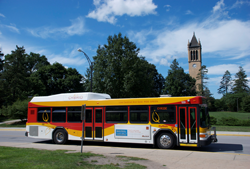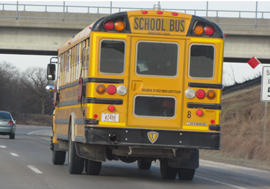Researchers
About the research
The objective of this project was to evaluate the in-use fuel economy and emission differences between hybrid-electric and conventional transit buses for the Ames, Iowa transit authority, CyRide. These CyRide buses were deployed in the fall of 2010.
Fuel economy was compared for the hybrid and control buses. Several older bus types were also available and were included in the analysis. Hybrid buses had the highest fuel economy for all time periods for all bus types. Hybrid buses had a fuel economy that was 11.8 percent higher than control buses overall, 12.2 percent higher than buses with model years 2007 and newer, 23.4 percent higher than model years 2004 through 2006, 10.2 percent higher than model years 1998 through 2003, 38.1 percent higher than model years 1994 through 1997, 36.8 percent higher than model years 1991 through 1993, and 36.8 percent higher for model years pre-1991.
On-road emissions were also compared for three of the hybrid buses and two control buses using a portable emissions monitor. On-average, carbon dioxide, carbon monoxide, and hybrid carbon emissions were much higher for the control buses than for the hybrid buses. However, on average nitrogen oxide emissions were higher for the hybrid buses.
The tech brief for this project presents an assessment of the costs and benefits of hybrid versus regular transit buses.
Researchers
Robert Sperry
Abhisek Mudgal
About the research
This report summarizes the evaluation results of an in-use fuel economy evaluation for two plug-in hybrid school buses deployed in two different school districts in Iowa. Each school district selected a control bus that runs a route similar to that of the hybrid bus. Odometer readings, fuel consumption, and maintenance needs were recorded for each bus. The buses were deployed in 2008.
Project Details
Iowa Energy Center
Researchers
Neal Hawkins
hawkins@iastate.edu email >Director Research Administration, ISU
About the research
The main objective is to identify best practices and leading technologies for energy efficient street lighting. The proposed research will develop a synthesis of energy efficient street lighting practices. It will include a synthesis of existing best practices to reduce energy use by state and local transportation agencies. It will also summarize state of the art technology to improve the energy efficiency of street lighting. This project will supplement current working being completed for the Iowa Highway Research Board, which is evaluating existing street lighting guidelines and developing recommendations for street lighting practices in Iowa.
Researchers
Stephen Andrle
Dennis Kroeger
Randy Boeckenstedt
About the research
The primary objective of this project was to develop awareness of alternative truck idle reduction technologies in Iowa, and along the Interstate-35 trade corridor. Sub-objectives were to:
- Organize and carry out a one to two day conference to be carried out sometime during May or June 2004, and that supports commercial adoption of idle reduction technologies in Iowa. Develop interim involvement of stakeholders with appropriate expertise, practical knowledge, contacts, and peripheral resources to support implementation of truck idle reduction technologies in Iowa.
- Carry out activities defined by an initial focus group survey to develop relevant knowledge relating to truck idle reduction technologies and implementation issues.
- Preparation for the conference was the central objective of the activities covered under this report. Supporting it required developing a summary understanding of key issues relating to truck idle reduction, aligning with key contacts and expertise, and defining and promoting the issue to a constituency base and target audience. The conference occurred on June 22-23, 2004 in Des Moines, and drew 69 attendees primarily from Iowa and the Midwest, with participation by state and federal agencies from throughout the country.

